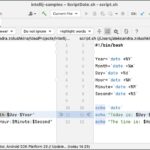Comparing two documents to identify differences is a common task in various fields. Whether you’re reviewing contracts, editing articles, or tracking revisions, knowing how to efficiently compare documents in Word is crucial. This article outlines effective methods for comparing documents and highlights the benefits of using dedicated comparison tools like Draftable.
Comparing Documents: Methods and Tools
Microsoft Word offers a built-in “Compare” feature that allows users to identify differences between two versions of a document. This feature highlights additions, deletions, and changes in formatting. To access this feature in Word:
- Open both documents you wish to compare.
- In one of the documents, go to the “Review” tab.
- In the “Compare” group, click “Compare.”
- Select the original and revised documents from the dropdown menus.
- Click “OK.”
Word will then generate a new document displaying the differences between the two versions. Deletions are marked with strikethroughs, additions are underlined, and formatting changes are highlighted.
While Word’s built-in feature is useful, dedicated document comparison tools offer enhanced functionality and accuracy. Draftable, for example, provides a comprehensive solution for comparing various file formats, including Word documents, PDFs, and Excel spreadsheets.
Advantages of Dedicated Comparison Tools
Draftable offers several advantages over Word’s built-in comparison feature:
Broader File Compatibility
Draftable supports a wider range of file formats, allowing you to compare documents even if they aren’t in the same format. This eliminates the need for converting files before comparison.
Enhanced Accuracy
Draftable provides more granular comparison results, identifying changes at the character level and detecting moved or edited text. This ensures a thorough analysis of the differences between documents.
Improved Workflow Efficiency
Draftable integrates with popular software like Microsoft Word and Outlook, streamlining the comparison process. Features like one-click comparison reports and seamless integration with document management systems significantly enhance workflow efficiency.
Choosing the Right Comparison Method
The optimal method for comparing documents depends on your specific needs. For simple comparisons of Word documents, the built-in Word Compare feature may suffice. However, for complex comparisons involving multiple file formats or requiring advanced features like character-level tracking, dedicated comparison tools like Draftable offer a superior solution.
Conclusion
Efficiently comparing documents is essential for accurate revision tracking and collaboration. While Microsoft Word offers a basic comparison feature, dedicated tools like Draftable provide enhanced accuracy, broader file compatibility, and improved workflow efficiency. By understanding the available options and their respective strengths, you can choose the best method for comparing documents and ensuring precise results.
